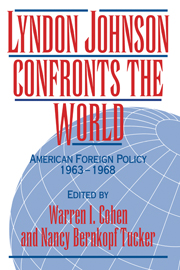Book contents
- Frontmatter
- Contents
- Dedication
- Acknowledgments
- List of Contributors
- Introduction
- 1 Lyndon B. Johnson: Change and Continuity
- 2 Johnson, Vietnam, and Tocqueville
- 3 “A Time in the Tide of Men's Affairs”: Lyndon Johnson and Vietnam
- 4 Threats, Opportunities, and Frustrations in East Asia
- 5 Toward Disillusionment and Disengagement in South Asia
- 6 Lyndon B. Johnson, Germany, and “the End of the Cold War”
- 7 The Promise of Progress: U.S. Relations with Latin America During the Administration of Lyndon B. Johnson
- 8 Keeping Africa off the Agenda
- 9 Balancing American Interests in the Middle East: Lyndon Baines Johnson vs. Gamal Abdul Nasser
- 10 Lyndon Johnson: A Final Reckoning
- Suggestions for Further Reading
- Index
Introduction
Published online by Cambridge University Press: 05 June 2012
- Frontmatter
- Contents
- Dedication
- Acknowledgments
- List of Contributors
- Introduction
- 1 Lyndon B. Johnson: Change and Continuity
- 2 Johnson, Vietnam, and Tocqueville
- 3 “A Time in the Tide of Men's Affairs”: Lyndon Johnson and Vietnam
- 4 Threats, Opportunities, and Frustrations in East Asia
- 5 Toward Disillusionment and Disengagement in South Asia
- 6 Lyndon B. Johnson, Germany, and “the End of the Cold War”
- 7 The Promise of Progress: U.S. Relations with Latin America During the Administration of Lyndon B. Johnson
- 8 Keeping Africa off the Agenda
- 9 Balancing American Interests in the Middle East: Lyndon Baines Johnson vs. Gamal Abdul Nasser
- 10 Lyndon Johnson: A Final Reckoning
- Suggestions for Further Reading
- Index
Summary
In 1968, shortly after Lyndon Johnson announced his decision to retire, a member of his staff prepared an assessment of Soviet– American relations during the Johnson presidency and called the president's tenure “the most productive period in the history of our relations, despite Vietnam.” A few months later, the Department of State in its internal history of the era described it as one of Soviet–American “coolness,” of conflict and cooperation, with conflict dominant. Of course, during the intervening months the Soviets had led their Warsaw pact allies in an invasion of Czechoslovakia, precluding the agreement on strategic arms control with which Johnson had intended to cap his career. But the conflicting estimates of the central relationship of the Cold War provide a useful framework for studying Lyndon Johnson's foreign policy – and its frustrations. It is against the background of the strategic competition between Moscow and Washington that the events analyzed in this book – in Asia, Europe, Latin America, Africa, and the Middle East – come into focus.
John F. Kennedy's legacy to Lyndon Johnson was a world, including America's NATO allies, increasingly less responsive to American leadership. Kennedy left Johnson a people who were losing interest in foreign aid, which seemed to be accomplishing little, and in the United Nations, which had become a forum for newly emergent states not sympathetic to American values or con-cerns. And he left Johnson a war that was going poorly in Vietnam.
- Type
- Chapter
- Information
- Lyndon Johnson Confronts the WorldAmerican Foreign Policy 1963–1968, pp. 1 - 8Publisher: Cambridge University PressPrint publication year: 1995



